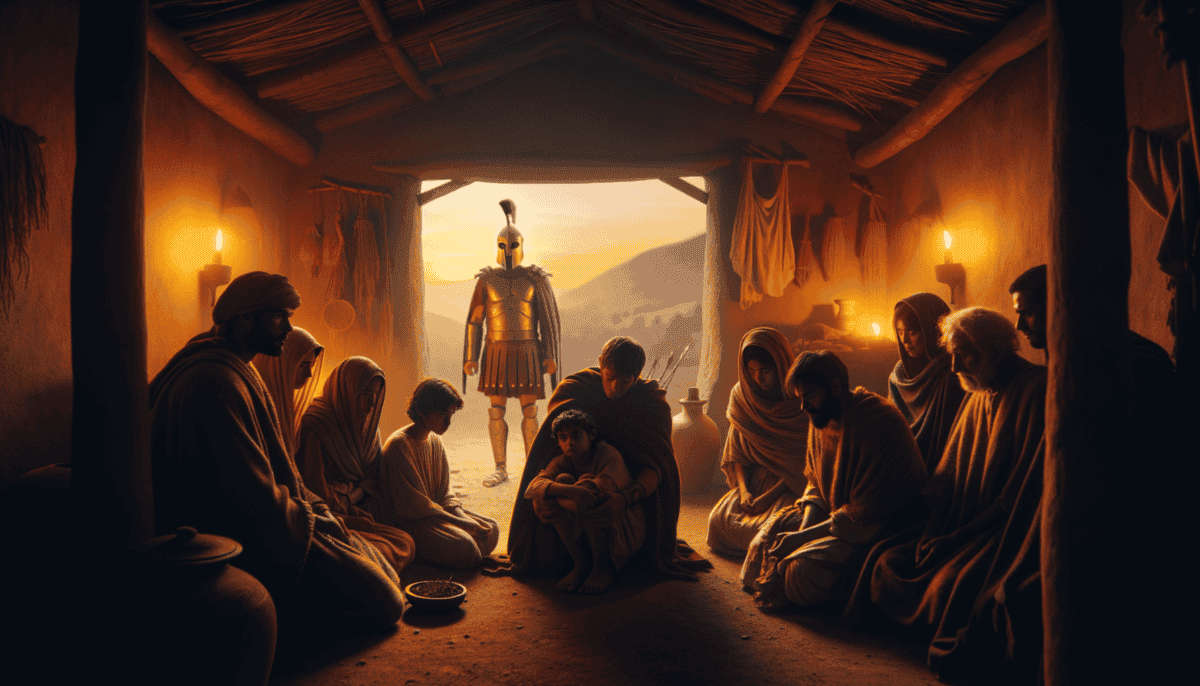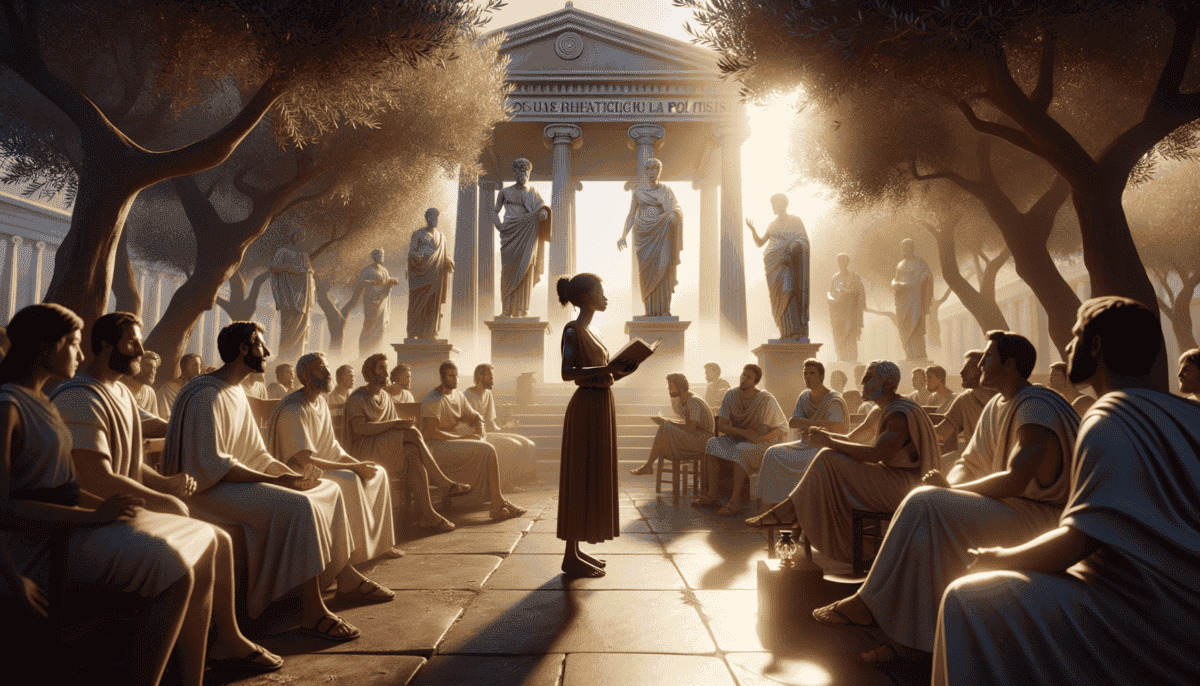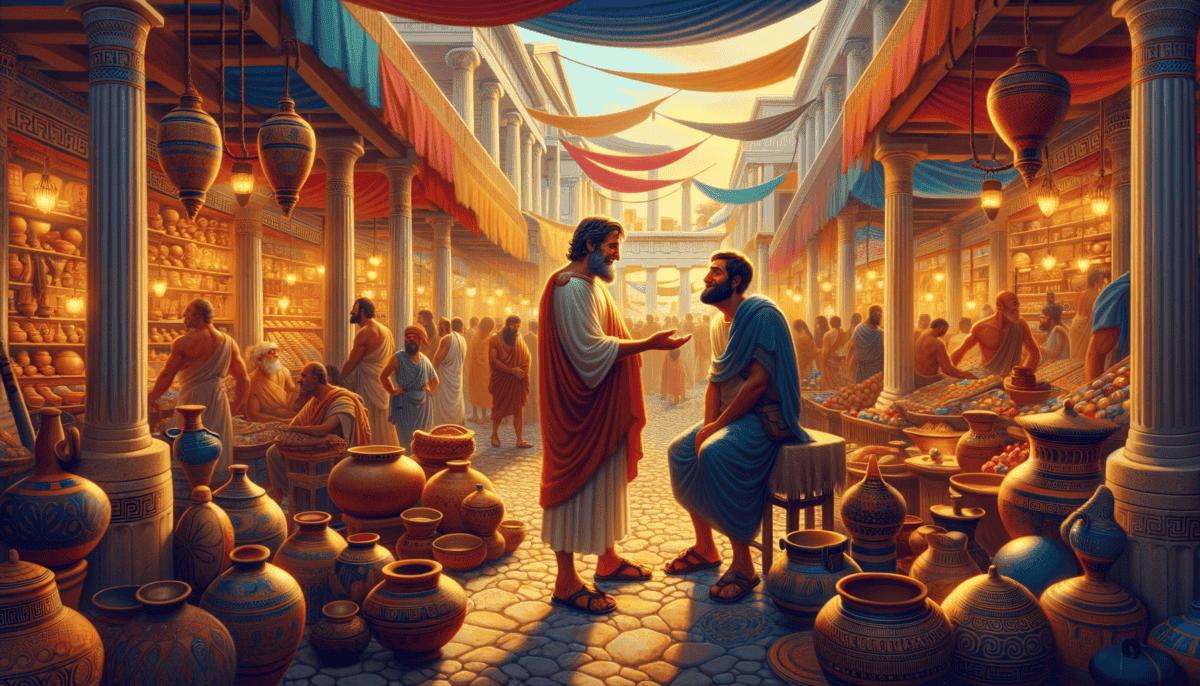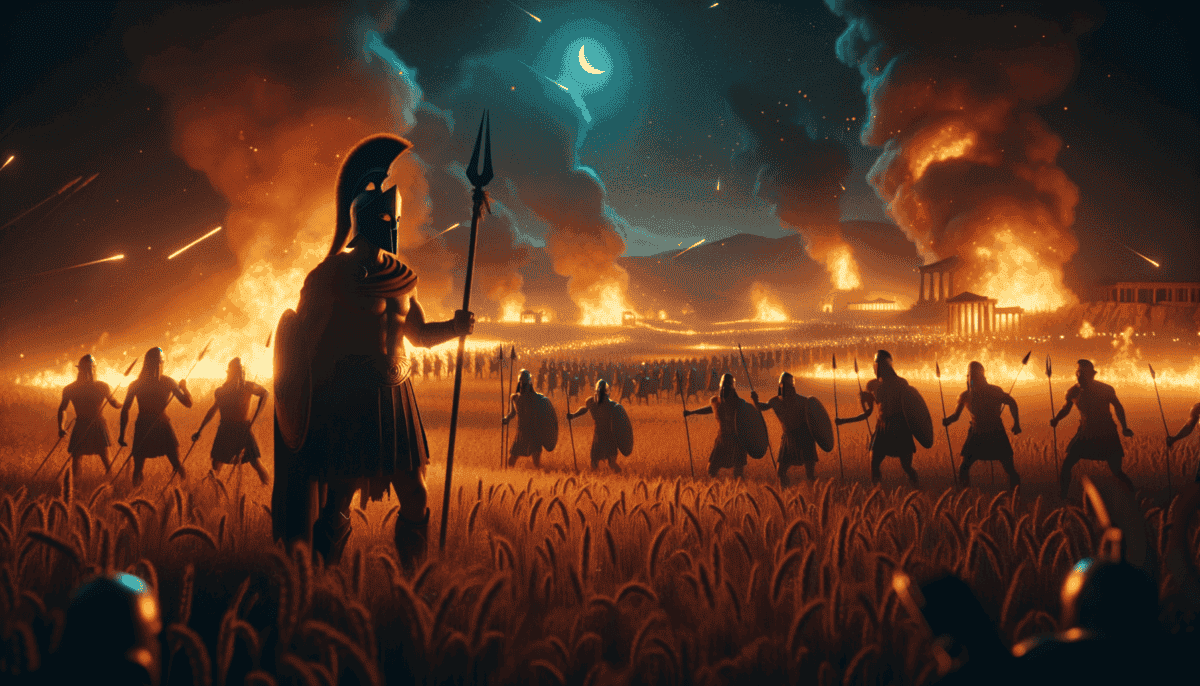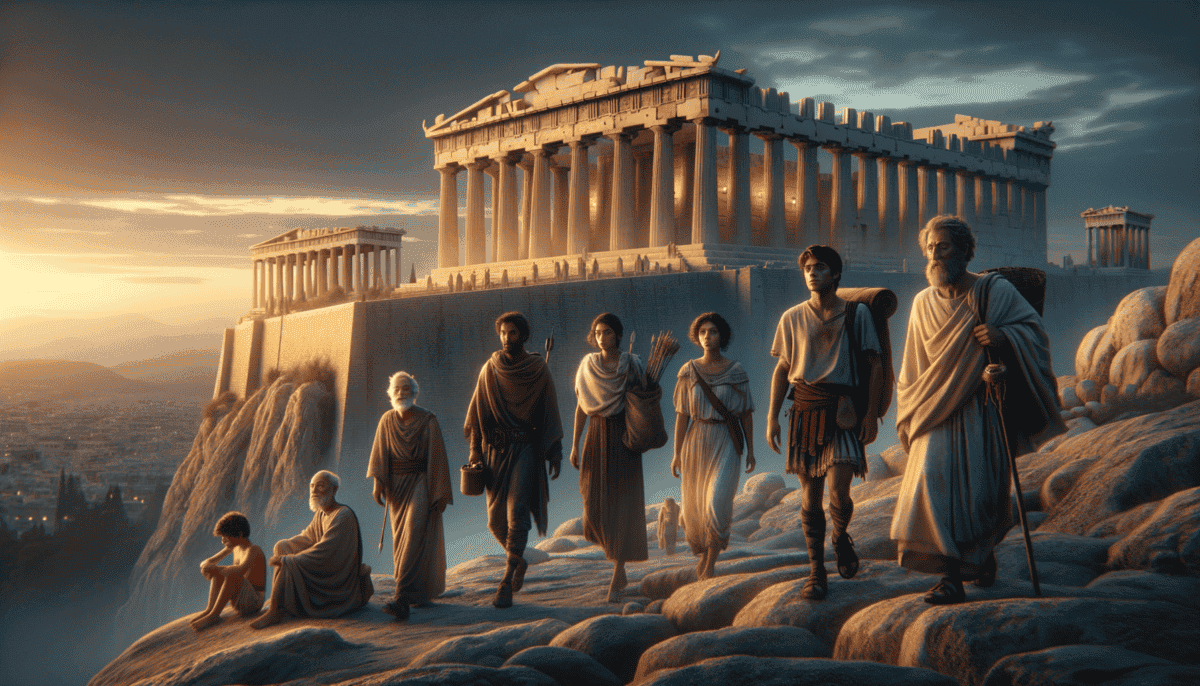The Silver Mines of Laurion
The dark tunnel stretched endlessly before Demetrios as he crouched low, his small hands gripping the heavy mining pick. At twelve years old, he was one of the youngest slaves working in Athens' silver mines. The flickering light from his oil lamp cast dancing shadows on the rough stone walls.
"Keep moving, boy!" The overseer's harsh voice echoed through the tunnel.
Demetrios wiped the sweat from his brow with a trembling hand. His muscles ached from hours of chipping away at the hard rock. The air was thick and hot, making it hard to breathe.
“One day, I’ll see the sun again,” he whispered to himself. “One day, I’ll be free.”
The mines of Laurion were the heart of Athens' wealth. Deep underground, thousands of slaves worked day and night to extract the precious silver that made the city powerful. For Demetrios, this dark world had become his whole life since being sold into slavery two years ago.
A Day in the Mines
Dawn broke over Athens, but underground, time stood still.
The daily routine was always the same:
• Wake before sunrise
• Climb down the deep mine shafts
• Chip away at rock for silver ore
• Carry heavy loads to the surface
• Work until you could barely stand
"Remember when we could see the stars?" asked Theron, an older slave who worked beside Demetrios. The boy nodded, trying to picture the night sky he hadn't seen in months.
Demetrios watched as workers hauled baskets of silver ore up narrow shafts using rope pulleys. His own basket felt heavier with each passing hour. The mine's passages were so narrow that only children could reach some of the deepest veins of silver.
"Why do they need so much silver?" Demetrios asked Theron one day.
The older slave smiled sadly. "Athens needs it for coins, for trade, for power. Without us slaves working these mines, the city wouldn't be rich and strong."
Dreams of Freedom
At night, in the small cave where he slept with other slave children, Demetrios would dream of his home by the sea. He remembered the salty breeze, his mother's cooking, and playing with his little sister.
"Tell us another story about the outside world," the other children would beg him.
Demetrios shared tales of festivals, marketplaces, and ships sailing across the blue Mediterranean. These stories kept their hopes alive in the darkness.
The overseers were always watching, their whips ready for any slave who worked too slowly or showed signs of resistance. But even they couldn't stop Demetrios from dreaming.
One morning, as he descended into the mine shaft, Demetrios saw a ray of sunlight pierce through a crack in the rock above. It reminded him that somewhere up there, life went on. People walked freely under the open sky, while below, thousands of slaves like him worked in darkness to keep Athens wealthy.
"Stay strong," Theron would tell him. "Even in the darkest mine shaft, hope finds a way to shine through."
“Gods of Olympus, hear my plea,
Let silver turn to liberty,
Guide me through these tunnels deep,
Until my freedom I can keep.”
As another long day in the mines began, Demetrios gripped his mining pick tightly. He might be a slave now, but in his heart, he held onto the hope that one day he would see the sun again – not through a crack in the rocks, but as a free person under the vast Athenian sky.
Life Among the Helots
The morning sun rose over the fertile valley of Messenia, where Kastor and his family worked the land that belonged to their Spartan masters. Like all Helots, they were tied to this soil, bound by generations of state-controlled slavery.
“Quick, children!” Kastor’s wife Elena whispered urgently. “The Spartan patrol is coming!” Their children, Lyra and Mikon, ducked behind tall wheat stalks as armored figures marched past their field.
“Remember,” Elena always told them, “we may work like slaves, but our spirits remain free.”
Daily Life Under Spartan Rule
The Helot family’s tiny home sat at the edge of vast farmlands. Every day brought the same tasks:
• Plowing the fields before sunrise
• Tending crops under the hot sun
• Preparing food for Spartan masters
• Hiding from cruel young warriors
• Teaching children to survive
“Papa, why do the Spartans hate us?” eight-year-old Lyra asked one evening as they ate their small portion of barley porridge.
Kastor sighed. “They don’t hate us, little one. They fear us. There are many more Helots than Spartans. That’s why they watch us so closely.”
The Crypteia Terror
Every autumn brought a terrifying tradition. Young Spartan warriors would hide during the day and hunt Helots at night. They called it the crypteia.
Elena taught her children clever ways to stay safe:
“Walk without making noise, like a cat stalking mice,” she showed them. “Learn which herbs can heal wounds. Remember every hiding spot in the valley.”
Secret Hopes
Despite their harsh life, the family found small joys. Ten-year-old Mikon learned to play reed pipes, making music when the Spartans weren’t around. Lyra discovered she could weave beautiful patterns into cloth, telling stories without words.
“Quiet as moonlight, strong as stone,
Our hearts beat free though we’re not our own,
When darkness passes, light will show
The path to freedom all will know.”
One evening, as the family huddled around their small fire, Elena shared stories passed down through generations. Tales of a time before slavery, when their ancestors lived freely in these same valleys.
“The old ways are not forgotten,” she whispered. “They live in our songs, our stories, our hearts.” ❤️
Young Lyra looked up at the stars through a hole in their roof. “Will we ever be free, Mama?”
Elena hugged her daughter close. “Freedom lives first in here,” she touched Lyra’s heart. “No one can take that from us, not even the mighty Spartans.”
Outside, a wolf howled in the distance. The sound reminded Kastor of the coming crypteia season. He checked the cellar door, making sure it was well-hidden under fresh straw. Their survival depended on staying one step ahead of their masters.
As night fell over Messenia, the Helot family prepared for another day of working lands they could never own. But in their hearts, they kept alive the dream of freedom, passing it from parent to child like a precious flame that refused to die.
Voices of Wisdom
The sun cast long shadows across the marble steps of the Athenian Agora. A small crowd gathered to hear the daily debates. Among them stood Alexandros, a young scholar with questioning eyes. ️
“Natural slaves,” boomed the voice of Master Kleitos, an aging philosopher. “Some are born to serve, while others to lead. This is the natural order!”
“Those who can use their minds should rule. Those who can only use their bodies should serve.”
Alexandros felt his face grow hot. He thought of Demetrios, the young slave he’d met at the silver mines. Was that boy really born to dig in darkness?
Questions in the Garden
Later that day, in a quiet garden, Alexandros found his teacher, Sofia. Unlike many philosophers, she questioned the common wisdom about slavery.
“Teacher,” Alexandros asked, “how can we say some people are born to be slaves when they think and feel just like us?”
Sofia smiled. “A wise question, young one. Look at this olive tree. Does it grow because that is its nature, or because someone planted it here?”
“We make slaves, Alexandros. Nature makes only people.”
Different Voices
The marketplace buzzed with different ideas:
“Without slaves, our city would crumble!” shouted another.
“What makes a master better than a slave?” asked a third.
Alexandros wrote down everything he heard. He wanted to understand. His scrolls filled with questions:
How can we say what’s natural?
Who decides who serves?
What makes someone free?
A Hidden Truth
One evening, Alexandros found an old slave named Theron cleaning the school. The old man’s eyes held wisdom earned through years of watching and listening.
“Young master,” Theron said softly, “the greatest minds speak of natural order, but have they ever asked a slave what feels natural?”
This simple question hit Alexandros like a thunderbolt. He began to see how the mighty minds of Athens built grand ideas on shaky ground.
Seeds of Change
In his own writing tablet, Alexandros began to write new ideas:
Sofia watched her student’s growing understanding with pride. “Questions,” she said, “are more powerful than answers. They are the seeds of change.”
As night fell over Athens, Alexandros walked home through torch-lit streets. He passed slaves closing shop doors and carrying water jugs. Each face held a story, a mind, a heart – just like his own.
He thought of Demetrios in the mines, of Theron’s wise eyes, of all the voices unheard in the grand debates. Tomorrow, he would speak up in the Agora. Not all would listen, but some might hear. And that would be a beginning.
Dreams of Liberty
The morning sun painted Athens in golden light as Demetrios counted his copper coins again. His hands trembled with excitement. After three years in the silver mines, he had saved enough to dream of freedom.
The Price of Hope
“Two hundred drachmas,” he whispered, touching each coin carefully. His friend Marcus, an older slave, had taught him to hide money in a hollow tree near the mines.
“Almost there,” Marcus smiled, patting Demetrios on the shoulder. “Just a few more months of work.”
Stories of Success
During their short rest breaks, slaves shared tales of those who had won their freedom:
“Old Phillip bought his freedom by teaching rich children to read!”
“Even Cyrus the cook earned his way out!”
These stories gave Demetrios hope. But freedom wasn’t just about money. He needed his master’s agreement too.
The Kind Teacher
Alexandros, the young scholar who visited the mines, started teaching Demetrios to read. They met secretly near the olive groves.
“Knowledge is power,” Alexandros would say. “When you’re free, you’ll need more than just strong arms.”
“Freedom lives first in the mind, then in the world.”
Hard Choices
One day, a sick miner needed medicine. Demetrios looked at his savings, then at his friend’s pale face. He remembered how others had helped him.
He used some of his freedom money to buy the medicine. His dream would take longer, but his heart felt lighter. ❤️
New Ways Forward
Sofia, Alexandros’s teacher, started visiting the mines too. She knew people who helped slaves gain freedom:
• Temples sometimes helped free slaves
• Special jobs could earn extra money
• Some masters freed good workers
She helped Demetrios make a plan. He would learn to write, save money, and prove his value to his master.
A Growing Movement
More people in Athens started questioning slavery. Some masters began freeing their slaves. Others made deals to let slaves earn their freedom.
“Change comes slowly,” Sofia explained, “but it comes. Like water wearing away stone.”
Demetrios added another coin to his savings. Each one brought him closer to freedom. But now he understood something new – he wasn’t just saving money. He was part of something bigger.
As the sunset turned the sky purple, Demetrios practiced writing his name in the dirt. Soon, he hoped, he would write it on his freedom papers. But for now, he had his dreams, his friends, and a path forward.
Rising Against Chains
The Spartan hills echoed with whispers of rebellion. The helots had suffered too long. Tonight, everything would change.
Secret Meetings
In a hidden cave, Lysander, a brave helot leader, gathered his people. Torchlight danced on determined faces.
“We are not born to be slaves,” he said softly. “Tonight, we show them our strength.”
Among the crowd sat young Demetrios, who had escaped from Athens. His heart pounded with both fear and hope.
The Plan Takes Shape
They divided into groups. Some would create distractions. Others would free those locked in houses. The strongest would guard the escape routes. ️
“Remember,” Lysander warned, “we fight for freedom, not revenge.”
Brave Hearts
An old woman stepped forward, her voice strong:
Children helped by carrying messages between groups. Women prepared food and medicine. Everyone had a part to play.
The Night of Change
As darkness fell, the rebels moved silently. They used bird calls to signal each other. The plan worked perfectly at first:
- Guards fell asleep at their posts
- Doors opened quietly
- Families reunited
- Hope spread like wildfire
Facing Challenges
But then, a dog barked. A torch fell. Shouts broke the night’s silence.
Demetrios helped guide children to safety. He remembered his own escape, how others had helped him. Now it was his turn to help.
Standing Together
Some Spartan guards, seeing such bravery, lowered their weapons. One even helped an old man escape.
Dawn of Freedom
As morning light touched the hills, hundreds of helots reached the safe forests. They carried little, but they had what mattered most – their freedom.
Lysander gathered the freed people. “This is just the beginning,” he said. “We must help others find their way to freedom too.” ⭐
Demetrios looked at the rising sun, thinking of his friends still in Athens. He knew their day would come too. The spirit of freedom, once awakened, could never be chained again.
The rebels started their journey to a new home, where they would build lives as free people. Their story would inspire others for years to come.
Echoes of Liberty
Years passed after the great helot escape. Demetrios, now grown, stood on a hill overlooking Athens. The silver mines where he once worked looked smaller now.
Seeds of Change
In the marketplace, something amazing was happening. People talked openly about slavery being wrong. Even some rich citizens freed their slaves.
“Times are changing,” said an old philosopher to his students. “We see now that all humans deserve to be free.”
Demetrios smiled, remembering his journey. He now helped other slaves find their way to freedom.
New Ways of Thinking
Young children learned different lessons than their parents did. They asked hard questions:
- Why do some people own others?
- Aren’t all people born free?
- How can we make things fair?
- What makes someone truly free?
Stories of Hope
Lysander’s rebellion became a famous story. Parents told their children about the brave helots who chose freedom.
A New World Growing
The silver mines still operated, but with paid workers now. Former slaves became teachers, traders, and leaders.
One day, Demetrios met a young girl near his old mine. She was free, but her grandmother had been a slave.
“Tell me about the old days,” she asked. “How did people learn to be better?”
Wisdom Shared
In Sparta, the children of helots went to school alongside others. The old ways of slavery began to fade like shadows in morning light.
Looking Forward
Demetrios kept a small piece of silver ore on a string around his neck. It reminded him of where he came from and how far things had come.
“The future,” he told the young girl, “belongs to those who believe in the beauty of every person’s dreams.” ⭐
The Light Spreads
The changes in Greece spread to other lands. People everywhere began to see that freedom was a right for all, not just some.
As the sun set over Athens, Demetrios watched children playing freely in the streets. Their laughter echoed with hope for tomorrow.
The story of slavery in Greece became a lesson: that people can learn, grow, and make better choices. The torch of freedom, lit by brave hearts like Lysander and Demetrios, continues to light the way forward.


